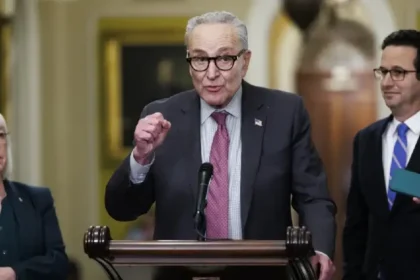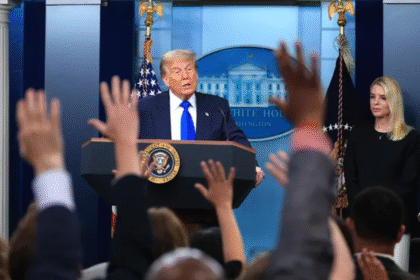Federal Court Rules Trump Administration Must Resume Payments Immediately
A federal judge has ordered President Donald Trump’s administration to make immediate payments under the Supplemental Nutrition Assistance Program (SNAP), commonly known as food stamps, following weeks of delays tied to the recent government funding dispute. The decision, handed down late Friday in Washington, D.C., affects more than 40 million Americans who depend on the program to afford groceries.
Judge Marcia Reynolds of the U.S. District Court ruled that the Department of Agriculture (USDA) “violated its statutory obligation” by failing to ensure timely benefit distribution. Her order mandates that the administration disburse all pending payments within five business days.
“The executive branch does not have the authority to delay or withhold essential nutrition assistance due to political gridlock,” Reynolds wrote. “The law requires that these payments reach eligible families without interruption, particularly during times of economic strain.”
The ruling follows a week of legal and political turmoil as several advocacy organizations sued the administration, alleging that the delays placed millions of households at risk of food insecurity.
Background: A Funding Standoff with Real-World Consequences
The controversy erupted when Congress failed to pass a full-year budget, forcing the government to operate under a temporary funding measure. As negotiations dragged on, the Trump administration signaled that SNAP payments could be delayed if the continuing resolution expired without a new agreement.
While administration officials insisted they were following federal budget constraints, advocates accused them of using food assistance as a political bargaining chip.
“The delays were never about logistics,” said Sarah Jennings, director of the National Food Policy Center. “They were about leverage. Families shouldn’t go hungry while Washington argues over budget priorities.”
SNAP provides monthly assistance to low-income households, allowing recipients to purchase food using an electronic benefits card. The program, one of the largest social safety nets in the country, has been a frequent point of contention in federal spending debates.
The Trump Administration’s Response
In response to the court order, a senior administration official said the White House “will comply with the judge’s decision” but expressed disappointment with what they described as “judicial overreach into fiscal management.”
“President Trump has always prioritized American families,” the official said in a statement. “However, we believe that fiscal responsibility and adherence to appropriations law must guide how and when funds are distributed. We are reviewing our legal options.”
The USDA, which administers SNAP, acknowledged that some payments had been delayed but argued that the agency was “working within statutory limits” imposed by Congress’s failure to provide long-term funding.
However, the court found that existing emergency provisions gave the USDA sufficient flexibility to continue payments uninterrupted.
Human Impact: Millions Waiting for Relief
Across the country, the ruling sparked both relief and frustration among recipients who had been struggling to stretch dwindling resources.
In Ohio, single mother Jasmine Moore said she had spent the last two weeks skipping meals to ensure her children could eat. “We were told the benefits were coming, but every day it was just waiting,” she said. “If the judge hadn’t stepped in, I don’t know what we would’ve done.”
Food banks nationwide have reported surges in demand as families sought assistance amid uncertainty over SNAP disbursements. According to Feeding America, requests for emergency food boxes rose nearly 25% in late October compared to the previous month.
Economists warn that delays in food stamp payments also carry broader consequences, as lower-income households tend to spend benefits immediately—providing a boost to local economies. “Every dollar in SNAP generates roughly $1.50 in economic activity,” said Mark Feldman, an economist at the University of Michigan. “When those payments stop, it ripples through grocery stores, farmers, and suppliers.”
Legal and Political Fallout
The judge’s ruling adds another layer to the Trump administration’s ongoing fiscal and legal challenges. Earlier this year, several states sued over proposed SNAP reforms that would have tightened work requirements and reduced eligibility. Those efforts were blocked by federal courts, which found that the administration had failed to follow proper rule-making procedures.
The White House’s critics argue that the repeated legal defeats highlight a pattern of overreach in handling welfare programs. “This administration has been relentless in undermining social safety nets,” said Senator Maria Torres (D-CA). “The court’s ruling reaffirms what we’ve said all along: you can’t hold hungry families hostage to politics.”
Republican lawmakers, however, defended the president’s fiscal approach, calling the decision an unnecessary intrusion. “This ruling ignores the real issue—Congress’s failure to pass responsible spending legislation,” said Representative Dan Kline (R-TX). “The president is doing what he can within the law.”
Looking Ahead: Immediate Relief, Uncertain Future
The USDA is expected to begin issuing payments within the next few days, as ordered by the court. However, experts warn that without a longer-term budget resolution, the program could face similar disruptions in the coming months.
Advocacy groups are urging Congress to pass a permanent funding guarantee for SNAP, ensuring that benefits continue even during shutdowns or continuing resolutions. “Food shouldn’t be a casualty of politics,” said Jennings. “We need structural reform that prevents this from happening again.”
For now, the ruling marks a temporary reprieve for millions of Americans who depend on the program. As one recipient put it outside a community center in Detroit, “We’re just trying to feed our kids. We don’t care who wins in Washington—just that we can eat tonight.”











